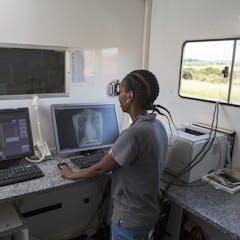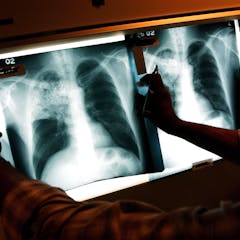
Articles on Tuberculosis (TB)
Displaying 41 - 60 of 178 articles

Manufacturers and health systems have shown that vaccines can be quickly and effectively deployed when accompanied by keen political and financial commitments.

As a disease progresses, so too must the underlying data and reporting improve to manage the progression of the outbreak.

The challenges presented by the pandemic are an opportunity for African health systems to move beyond their current limitations.

After a nose swab tests positive for a virus or bacteria, scientists can use the sample’s genetic sequence to figure out where and when the pathogen emerged and how fast it’s changing.

This challenges the current assumption that coughing is the primary driver of TB transmission.

Progress against tuberculosis has long been inadequate to reach the target of elimination by 2030. But before the COVID-19 pandemic the world was making steady progress in diagnosing and treating TB.

Countries must be encouraged to distribute essential healthcare provision - like diagnosis - to where people most need them and where they can be accessed more easily.

Smallpox, tuberculosis, measles, syphilis … a new book describes how recurring epidemics nearly wiped out Australia’s First Peoples.

COVID has shown us we can develop a range of safe and effective vaccines. Now we need to do the same for TB.

BCG remains the only widely available vaccine for TB. Yet the development of a COVID-19 vaccine over the last year shows that there is capacity to rapidly create new vaccines.

South Africa needs a public health response that expands the successes of the country’s HIV testing and treatment programme to provide care for multiple diseases.

Not achieving the targets for children and adolescents in sub-Saharan Africa means that new infections will continue to increase and HIV related mortality will be a reality for decades to come.

She believed and advocated that Africa needs to find solutions to its own problems and worked tirelessly to build biomedical engineering capacity across the continent.

The key actions needed to end AIDS are relatively clear. The question is whether every government, funder, and implementing organisations will apply them.

Until vaccines that are capable of protecting all populations against TB are developed, treatment is the best option to preventing infection.

An out-of-control COVID epidemic in PNG would be a humanitarian and economic disaster for the nation itself, and a grave threat to the region.

South Africa’s long-awaited TB prevalence survey results were recently released. They reveal that the country has a much higher burden of TB than previously thought.

Where there are not enough health workers to deliver medical care, one solution is to move certain tasks to less specialised health workers, a process called task-shifting.

Doubt can be uncomfortable. It is often tempting to jump to conclusions. But Keats counsels otherwise.

Tuberculosis is a global threat and a public health concern on a scale similar to COVID-19.
